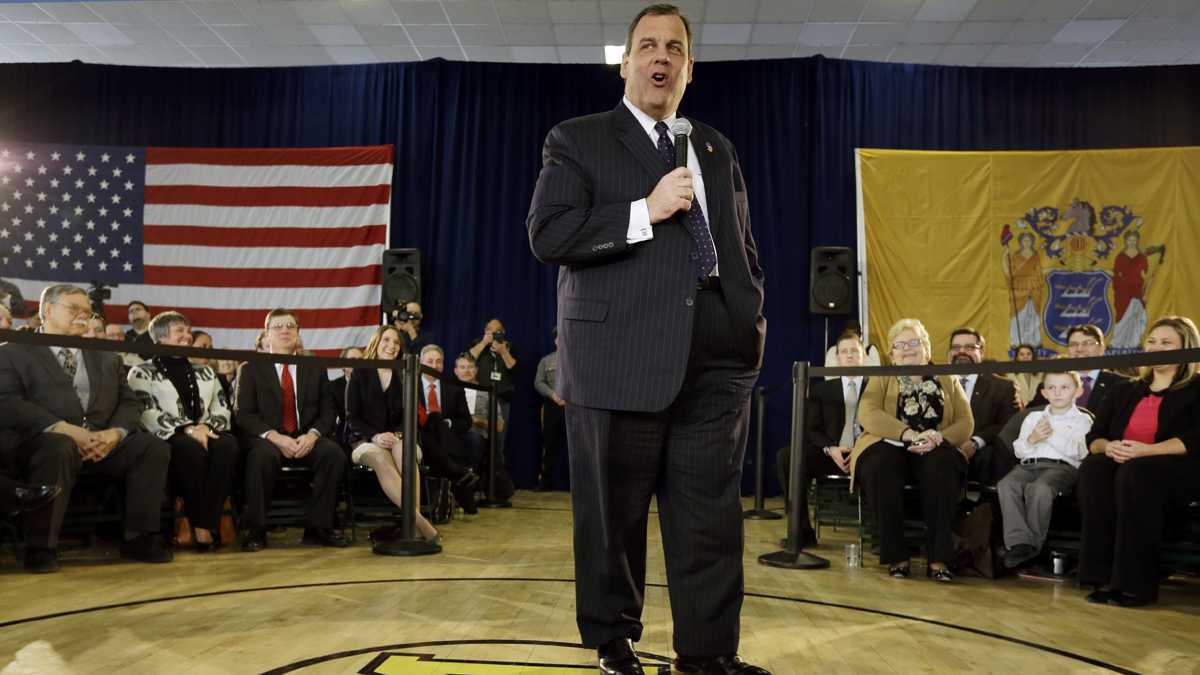Gov Christie’s record on pensions: Broken promises, no effective fix

Gov. Christie at a town hall meeting Weds, Feb. 25, 2015, in Moorestown, N.J. (AP File Photo/Mel Evans)
Gov. Chris Christie once bragged about “fixing” New Jersey’s beleaguered public-employee pension system with a series of reforms that were enacted during his first two years in office.
But now, as the second-term Republican prepares to present a final state budget to lawmakers next week, the retirement funds for public workers remain a huge problem, and any long-term solution will likely not come from Christie, but from a successor who will be elected later this year.
Christie confirmed during a recent NJ 101.5 FM radio appearance that he’s planning to boost the annual state pension contribution up to $2.5 billion in the 2018 fiscal year spending plan. The increase would set a record for state pension funding in a single budget, but also fall well short of the full amount that actuaries say is needed to return the retirement system to overall good health. And it was Christie, in 2010, who signed a law that committed the state to fully funding the actuarial estimate by the 2018 fiscal year.
Christie, meanwhile, also left the door open during the radio interview to calling on lawmakers to approve new benefits cuts for public workers along with the next state budget. That comes even after he bragged in 2011 that benefits changes passed that year were “providing real, long-term fiscal stability for future generations.”
Sweeney issues challenge
Senate President Stephen Sweeney (D-Gloucester) greeted Christie’s recent comments on the pension issue by challenging him to live up to a new law that will require the pension contribution to be broken up into quarterly payments made throughout the 2018 fiscal year. And public worker unions pointed to the lingering consequences of Christie’s 2014 decision to ditch the more aggressive pension-funding schedule that he committed to in 2010, suggesting they’re already looking to the winner of this year’s gubernatorial election to come through for a pension system that 780,000 current and retired workers are counting on to fund their retirements.
Christie’s comments on the fiscal year 2018 budget and pension funding came last week as radio show host Eric Scott asked him several questions about the upcoming budget address, which the governor is scheduled to deliver to a joint session of the Legislature on February 28. The budget is “85 percent done,” Christie said, adding he doubts there will be any “big surprises.”
The governor also voiced a complaint about the impact that the pension system has on the overall budget, which totals $34.5 billion in the current fiscal year. Under a revised pension-funding plan Christie first put forward in 2015, the state will add about $650 million to the $1.86 billion that’s budgeted for the current fiscal year, an increase that will consume much of any expected economic growth, he said.
“Until we fix the pension and health benefit issue there is going to continue to be enormous pressure on the state budget,” Christie said. He also told Scott to “stay tuned” when the radio host asked if new benefits cuts would be proposed along with the new budget.
New health and benefit cuts unlikely
But Democratic legislative leaders are unlikely to have any appetite to hit workers with new cuts in a year when all 120 legislative seats and the governor’s office will be up for grabs in the fall. While Democrats are expected to retain their control of the Legislature, they’re also hoping to take advantage of Christie’s historically low approval ratings to take back control of the governor’s office as well.
“We already made reforms to the system, and it’s the administration’s responsibility to live up to the agreement and make the required pension payments as scheduled,” said Sweeney in response to Christie’s radio interview.
If Christie does increase the state-pension contribution up to $2.5 billion, the payment would equal 50 percent of the amount calculated by actuaries for the 2018 fiscal year. Christie pledged to ramp up the annual pension payment in 10 percentage-point increments back in 2015 after going back on a promise the year before to stick to a seven-year ramp up schedule that was established in a 2010 law. In 2011, Christie struck another deal with Democrats that called on workers to pay more for health coverage and toward their retirement.
But after state tax collections came up about $1 billion short of expectations in 2014, Christie decided to break his earlier promise on pension funding. Although public-worker unions immediately filed a lawsuit seeking to uphold the pension-funding law known as Chapter 78, the state Supreme Court, citing New Jersey constitutional requirements for a balanced budget and limits on borrowing, issued a ruling allowing Christie’s cuts to stand.
Had Christie lived up to his earlier funding promise, the pension contribution for the current fiscal year would be about $3.8 billion, with the next increase taking the payment up to about $4.5 billion. But under his new schedule, which he launched by contributing 30 percent of the actuarial estimate, full funding of the pension contribution is now estimated to be about $5 billion.
To help address the lingering pension-funding problem, Christie and lawmakers also agreed last year to adopt a new, quarterly payment schedule. That means the state is required to make its annual pension contribution in four separate installments instead of all at once at the end of the fiscal year. That change is intended to protect more of the pension contribution against budget cuts like those experienced in 2014, and also to get more money into the pension fund, which is professionally managed, over the course of the year, helping to maximize investment returns.
Senate president, ‘Pension Power Player’
Sweeney — who was recently included on a list of “Top Pension Power Players” that was published by “Institutional Investor,” a top international finance magazine — called Christie’s plan for making a $2.5 billion contribution a “down payment on the promise to provide the funds needed to put the pension system on the road to fiscal solvency and to support the pensions and benefits that are legally and morally promised to public employees.”
Sweeney also challenged Christie, who will be leaving office in early 2018 due to New Jersey gubernatorial term limits, to follow the quarterly schedule throughout his remaining months in the State House. Because it was established as a matter of law, the quarterly payment statute could fall victim to the same constitutional budget constraints that allowed Christie to break the earlier pension-funding promise.
“This is all about smart investment strategies and responsible fiscal practices that benefit everyone,” Sweeney said.
Steve Baker, a spokesman for the New Jersey Education Association, a union that has feuded with Christie on benefits issues throughout his tenure, said the focus has already shifted to next year, when New Jersey’s next governor will be sworn in.
“The difference between the state’s planned contribution for next year and the full required contribution it should be making is the Christie Gap,” Baker said. “Because of the Christie Gap, it’s going to take longer and cost more to get New Jersey back on track.”
“We look forward to working with the next governor and Legislature to closing the Christie Gap and returning New Jersey to regular, responsible pension funding,” Baker said.
_________________________________________________________
NJ Spotlight, an independent online news service on issues critical to New Jersey, makes its in-depth reporting available to NewsWorks.
WHYY is your source for fact-based, in-depth journalism and information. As a nonprofit organization, we rely on financial support from readers like you. Please give today.




